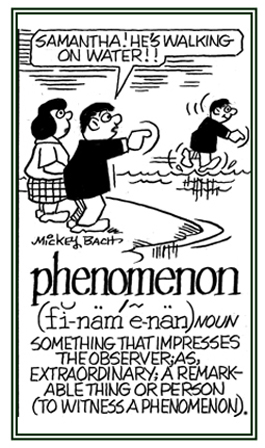2. Things that exist and can be detected by the senses; especially, things which are unusual or interesting: Donald believes in the paranormal and psychic phenomena that he has experienced.
3. Any states or processes known through the sensory faculties of the body rather than by intuition or reasoning: Lightning is an electrical phenomenon which many people have experienced.
4. In medicine: symptoms or occurrences of any sort, whether ordinary or extraordinary, in relation to a disease: Fever and inflammation are phenomena of physical ailments.
5. An unusual or extraordinary person, fact, or occurrence: A genius is sometimes called a phenomenon.
6. Etymology: from Greek phainomenon and Latin phaenomenom, "something which is seen or appears."

Go to this Word A Day Revisited Index
so you can see more of Mickey Bach's cartoons.
2. Any extremely unusual or extraordinary thing or occurrence that is known through the senses rather than known through thought or study: The neighbor was shocked with the phenomenon of a fire suddenly starting from an electrical explosion caused by her refrigeratorin her kitchen.
3. A fact of scientific interest that can be scientifically described, appraised, or explained: Gerald's chemistry instructor demonstrated the phenomenon of mixing chemicals to produce dyes for industrial purposes.
2. Very good or great; extremely unusual in a way that is very impressive: The book was a phenomenal success for several months.
Ed's phenomenal understanding of the single rare scientific phenomenon of ice crystals was amazing; however, he lost points in his essay by referring to it as a single rare scientific phenomena.
This gives way abruptly if the pressure to produce flexion is continued.
2. An initial marked resistance to passive movement, which then suddenly gives way.This variety of increased muscle tone is characteristic of spasticity as a result of disease or dysfunction of the pyramidal tracts.
The extrasensory mental processes involved in the alleged ability to send or to receive telepathic messages.
2. In parapsychology, this term refers to whatever it is that enables a person to perceive extrasensorially.This word was added so you will know that there is no known connection with this psi and the Greek psi (Ψ, ψ). This psi is said to be a shortening and alteration of parapsychological or a shortening of psychic or parapsychic.
2. Unusual, significant, or unaccountable facts or occurrences; marvels.
". . . it was later realized that the phenomenon of changing air pressure had accounted for the variations in temperature readings in the open thermoscopes."
2. A remarkable, talented, and unusual individual or event: Beethoven was considered to be a phenomenon among musicians.
The normal plural form of phenomenon is supposed to be phenomena; however, phenomenons is also usually acceptable when referring to people or things: Reckless speculators are phenomenons among today's investors.
Phenomena is the correct plural form for scientific content: The phenomena were observed by astronomers throughout the world.
Tomorrow's weather forecast calls for several atmospheric phenomena.
